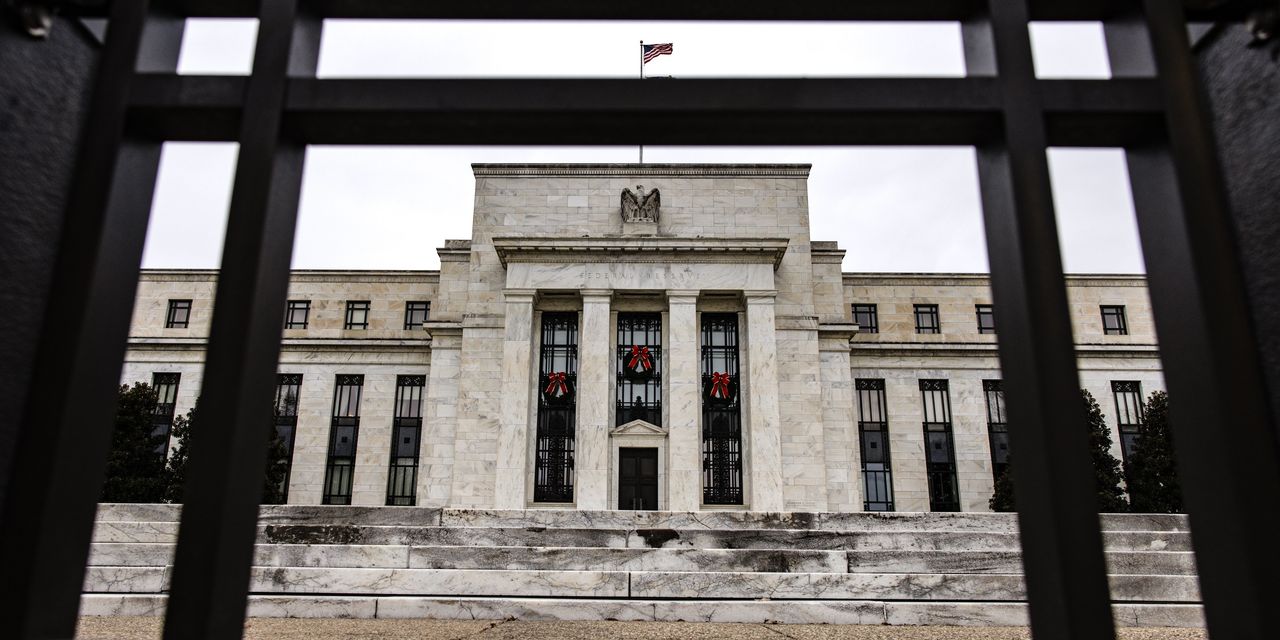
The double threat of an unpredictable pandemic and looming interest-rate increases is tempering investors’ optimism heading into 2022, a contrast to their vaccine- and stimulus-fueled enthusiasm of a year ago.
Investors had plenty to feel good about over the holidays. Supported by an economic rebound even stronger than most had expected, the S&P 500 climbed 27% in 2021, the third-largest gain of the past 20 years. U.S. crude surged 55% to roughly $75 a barrel. Interest rates on corporate bonds hovered around all-time lows, reflecting little perceived risk of default after a year in which few businesses went bankrupt.
Heading into 2021, economists surveyed by The Wall Street Journal had expected that the U.S. economy would grow 3.7% over the course of the year. Instead, it likely expanded more than 5%. The unemployment rate fell well below what economists had anticipated.
Still, few investors expect 2022 to go as well as 2021, with the Federal Reserve on the verge of raising interest rates, a new Covid-19 variant sweeping the country and government aid to families dwindling. Already, oil prices have slipped 11% since their highs in late October, reflecting traders’ concern about slowing demand for fuel. The S&P 500 spent much of the past two months trading sideways, while some speculative investments, such as shares of smaller, fast-growing tech companies, fell sharply—hurt by fears that they would be especially vulnerable to tighter monetary policies.
One major concern of investors: how different problems might feed on each other. Fresh waves of Covid-19 cases caused by new or existing variants might slow economic growth by reducing consumer spending. But some also worry that such surges could help sustain already-hot inflation by contributing to supply-chain problems and labor shortages—making it difficult for the Fed to push off short-term interest-rate increases even if growth does slow.
The biggest threat to riskier assets such as stocks is that “there are inflation problems that push the Fed to tighten too much,” said Jim McDonald, chief investment strategist at Northern Trust, the Chicago-based asset-management and banking firm. “And one of the causes of that could be pandemic-related supply disruptions,” he said.
Such anxieties have been particularly evident in the bond market, where yields on longer-term U.S. Treasury bonds have remained stuck in a narrow range below 2% even as shorter-term yields have climbed—suggesting that investors are both worried about the economic outlook and confident that the Fed is going to raise rates around three times in 2022.
Low long-term yields might comfort investors in some ways because they play a large role in determining borrowing costs across the economy. Lower yields also tend to boost the stock prices of fast-growing companies in particular by making their future earnings more valuable.
Economists, though, caution that higher short-term rates, even on their own, can slow the economy. And many think longer-term yields will rise as investors price in more rate increases beyond this year.
Despite the rising risks, many investors believe markets will power through the coming year, delivering returns that are solid even if they don’t quite measure up to recent years of outsize gains driven in large part by government-stimulus programs.
Mr. McDonald, for one, said corporate earnings are still likely to grow by double digits in 2022. Correspondingly, his team favors riskier assets such as developed-market stocks and lower-rated corporate bonds over safer assets such as cash and higher-rated bonds. He said longer-term rates should be held in check by technical factors, with a glut of savings continuing to pour into U.S. Treasurys.
Overall, analysts in December expected earnings to grow 9.2% in 2022, according to FactSet, down from an estimated 45.1% in 2021 but still comparable to 2017, when the S&P 500 gained 19%.
Of comfort to investors, stocks have generally performed well in years when the Fed has just started to raise interest rates. Investors also point to signs that each successive surge of Covid-19 has delivered a smaller hit to the economy as people learn how to cope with the virus. Many investors are also optimistic that inflation will subside this year, with the supply of goods catching up to demand. And some argue that increases in Covid-19 cases are more likely to slow inflation than accelerate it, meaning that the Fed could simply delay rate increases if the economy endures a rough patch.
“If we get really much slower growth, I think we get much faster disinflation,” said Brian Nick, chief investment strategist at Nuveen. In that case, he said, it is good that investors are already counting on several rate increases for 2022 because that means the Fed could actually ease financial conditions by delivering less than that.
The prospect of rising interest rates, though, remains a worry for investors, with most expecting an uptick in volatility—even if stocks keep broadly trending higher.
SHARE YOUR THOUGHTS
What’s your outlook for the markets in 2022? Join the conversation below.
Higher yields on government bonds can hurt stocks in several ways, from increasing borrowing costs for businesses to giving investors alternatives to earn decent returns. A combination of strong growth and rising yields should generally help businesses in economically sensitive sectors, such as banking and energy. But analysts warn that even that scenario can cause disruptions by causing investors to rotate out of tech stocks that are weighted heavily in major indexes.
Some investors say it is hard to imagine stocks avoiding struggles with climbing yields, given how low interest rates have fueled riskier investments during the pandemic.
If Treasury yields rise significantly higher, many investors believe such an increase would be particularly hard on the most-speculative trades: cryptocurrencies such as bitcoin; shares of smaller tech companies; and so-called meme stocks, including AMC Entertainment Holdings Inc. and GameStop Corp. , which have been popular among individual investors despite their struggle to turn profits.
“There were a lot of signs of speculation, consumer and otherwise, in 2021, and I think we should expect that to come down—it already sort of has started coming down—in anticipation of the Fed taking the punch bowl away,” said Jason Tauber, a portfolio manager at Neuberger Berman.
By some measures, stocks now trade at their highest prices relative to companies’ earnings since the late 1990s’ dot-com bubble. Still, some argue that they remain relatively inexpensive when accounting for low bond yields, meaning that there is room for yields to rise before stocks start looking broadly unattractive.
One measure known as the excess CAPE yield—showing the S&P 500’s inflation-adjusted earnings-to-price ratio minus inflation-adjusted bond yields—has recently been sitting around 3%, which is above the long-term average of about 2.5%, said Mr. Nick of Nuveen.
It is still the case that “you’re getting a little bit of a better deal on stocks than you normally would,” he said.
Write to Sam Goldfarb at [email protected]
Copyright ©2021 Dow Jones & Company, Inc. All Rights Reserved. 87990cbe856818d5eddac44c7b1cdeb8








